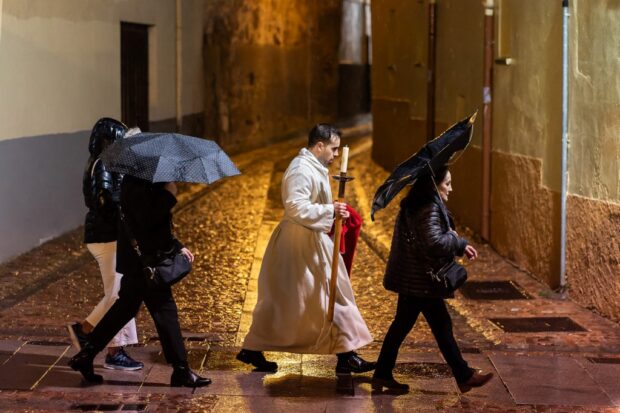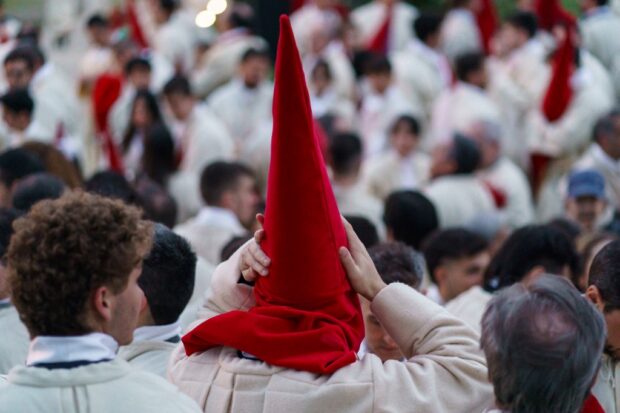Rain in Spain puts dampener on Good Friday parades

A penitent from the ‘Real Hermandad del Santisimo Cristo de las Injurias, Cofradia del Silencio’ brotherhood walks along the street after his procession was suspended due to the rain, during Holy Week in the northwestern Spanish city of Zamora on March 27, 2024. Christian believers around the world mark the Holy Week of Easter in celebration of the crucifixion and resurrection of Jesus Christ. (Photo by CESAR MANSO / AFP)
Madrid, Spain — Torrential rains forced the cancellation of famed Good Friday religious processions through Seville, leaving many faithful in tears in the southern Spanish city.
It is the first time since 2011 that all of the six night-time processions — the highlight of Christian Easter Week — were called off due to bad weather. The processions were suspended in 2020 and 2021 because of the Covid-19 pandemic.
READ: Pampanga ‘Kristo’ crucified for 35th time on Good Friday
Known as “La Madruga”, or “The Dawn”, the processions from midnight until dawn on Good Friday are organised by religious brotherhoods who spend months preparing for Easter week.
They attract tens of thousands of visitors from around the world who line the streets to watch the solemn parades featuring hooded penitents.
Article continues after this advertisementImages broadcast on Spanish television showed scenes of people crying and embracing after the processions were called off at the last minute.
Article continues after this advertisementSeville mayor Jose Luis Sanz said this year’s “La Madruga” would be a “fleeting memory” because of the rain.
“There are 385 days left to experience it again on our streets during Holy Week in Seville in 2025,” he added on X, formerly Twitter.

Penitents from the ‘Real Hermandad del Santisimo Cristo de las Injurias, Cofradia del Silencio’ brotherhood gather outside the cathedral prior to taking part in their procession, which was suspended due to the rain, during Holy Week in the northwestern Spanish city of Zamora on March 27, 2024. Christian believers around the world mark the Holy Week of Easter in celebration of the crucifixion and resurrection of Jesus Christ. (Photo by CESAR MANSO / AFP)
Spain’s meteorological agency, AEMET, issued weather warnings for 14 of the country’s 17 regions due to heavy rain, winds of more than 70 kilometres (40 miles) per hour and rough seas.
Four people died on Thursday in three incidents on Spain’s Atlantic and Mediterranean coasts after falling into the sea.
Rain also forced the cancellation of other Holy Week parades in Spain, from Cadiz in the southwest to Zaragoza in the north.
READ: ‘Senakulo’ staged in Zambales town on Good Friday
But the storms are otherwise good news for Spain where several regions, notably Andalusia in the south and Catalonia in the northwest, have been suffering from a prolonged drought.
Spain’s two most populous regions, Andalusia and Catalonia have both prepared to import fresh water by boat if needed.
Holy Week begins on Palm Sunday when Christians mark Jesus’ entry into Jerusalem followed just days later by his trial, crucifixion and death at the hands of the Romans, and his resurrection on Easter Sunday.
In Spain, the week is characterised by dozens of parades which date back to medieval times featuring elaborate floats topped with life-sized statues of Jesus and the Virgin Mary.
They are accompanied by hundreds of penitents, who traditionally wear flowing robes and have their heads covered by distinctive pointed hoods.